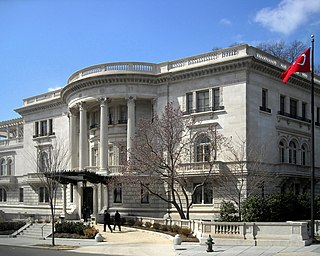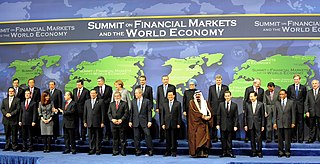Related Research Articles

The Middle East is a geopolitical region encompassing the Arabian Peninsula, the Levant, Turkey, Egypt, Iran, and Iraq. The term came into widespread usage as a replacement of the term Near East beginning in the early 20th century. The term "Middle East" has led to some confusion over its changing definitions, and being seen as too Eurocentric. The region includes the vast majority of the territories included in the closely associated definition of West Asia, but without the South Caucasus, and additionally includes all of Egypt and all of Turkey.

China, officially the People's Republic of China (PRC), has full diplomatic relations with 180 out of the other 192 United Nations member states, Cook Islands, Niue and the State of Palestine. As of 2024, China has had the most diplomatic missions of any state.

South Korea maintains diplomatic relations with 191 countries. The country has also been a member of the United Nations since 1991, when it became a member state at the same time as North Korea. South Korea has also hosted major international events such as the 1988 Summer Olympics and 2002 World Cup Football Tournament and the 2011 IAAF World Championships Daegu South Korea. Furthermore, South Korea had hosted the 2018 Winter Olympics which took place in Pyeongchang from 9 to 25 February.

Physically bridging Europe and Asia, Turkey is a secular country that has historically pursued a Western-oriented foreign policy. To this end, Turkey uses its global diplomatic network—the third most extensive—of 252 diplomatic and consular missions.

The Near East is a transcontinental region around the East Mediterranean encompassing parts of West Asia, the Balkans, and North Africa, including the historical Fertile Crescent, the Levant, Anatolia, East Thrace and Egypt. The term was invented by modern Western geographers and was originally applied to the Ottoman Empire, but today has varying definitions within different academic circles. The term Near East was used in conjunction with the Middle East and the Far East, together known as the "three Easts"; it was a separate term from the Middle East during earlier times and official British usage. Today, the terms Near East and Middle East are used interchangeably to refer to the same region.

In international relations, a middle power is a sovereign state that is not a great power nor a superpower, but still has large or moderate influence and international recognition.
The Senate Foreign Relations Subcommittee on East Asia, The Pacific, and International Cybersecurity Policy is one of seven subcommittees of the Senate Foreign Relations Committee.

The Committee on Foreign Affairs, previously called Political Affairs, is a committee of the European Parliament. It is responsible for the common foreign, security, and defence policy of the European Union, as well as relations with other European and international institutions, strengthening relations with third countries, the accession of new member states, and human rights. During the Ninth European Parliament (2019–2024), the committee has 79 members and is chaired by David McAllister from Germany.
The Senate Foreign Relations Subcommittee on Africa and Global Health Policy is one of seven subcommittees of the Senate Foreign Relations Committee.

The assistant secretary of state for Near Eastern affairs is the head of the Bureau of Near Eastern Affairs within the United States Department of State. The assistant secretary guides the operation of the U.S. diplomatic establishment in various countries of North Africa and the Middle East and advises the secretary of state and the under secretary of state for political affairs.
The Senate Foreign Relations Subcommittee on Europe and Regional Security Cooperation is one of seven subcommittees of the Senate Foreign Relations Committee.
The Senate Foreign Relations Subcommittee on Near East, South Asia, Central Asia, and Counterterrorism is one of seven subcommittees of the Senate Foreign Relations Committee.
The U.S. House Subcommittee on the Middle East, North Africa and Central Asia is a subcommittee within the House Foreign Affairs Committee. It was previously known as the Subcommittee on the Middle East, North Africa and Global Counterterrorism, only gaining jurisdiction over Central Asia policy during the 118th Congress.

The Ministry of Foreign Affairs of the Republic of Belarus is the Belarusian government ministry which oversees the foreign relations of Belarus.

H.R. 301, long title: "To provide for the establishment of the Special Envoy to Promote Religious Freedom of Religious Minorities in the Near East and South Central Asia," is a bill that was introduced in the United States House of Representatives during the 113th United States Congress. The bill would direct the President to appoint a Special Envoy to Promote Religious Freedom of Religious Minorities in the Near East and South Central Asia within the Department of State. The Special Envoy's duties would include promoting religious freedom, monitoring religious intolerance, and denouncing rights violations.
Alasdair Drysdale is professor emeritus of geography and formerly associate dean of the College of Liberal Arts at the University of New Hampshire.
Eric Bjornlund is an American expert in democratization assistance and election observation and co-founder and president of Democracy International and the author of Beyond Free and Fair: Monitoring Elections and Building Democracy. Bjornlund is also a lawyer and adjunct professor at Georgetown University.

Yleem D.S. Poblete is a former American government official who served as the United States Assistant Secretary of State for Verification, Compliance, and Implementation from April 30, 2018 to June 7, 2019. Poblete previously served as the Chief of Staff of the House Foreign Affairs Committee, where she worked for close to 20 years.

North Korea–Turkey relations are the foreign relations between North Korea and Turkey. The Turkish ambassador in Seoul is accredited to North Korea. North Korea's ambassador in Sofia, Bulgaria is accredited to Turkey.

Jürgen Coße is a German politician of the Social Democratic Party (SPD), who has served as a member of the Bundestag from 2016 to 2017 and again since 2021.
References
- ↑ "Subcommittee on Middle East, North Africa, and Central Asia". Committee on Foreign Affairs. Retrieved 2023-12-11.